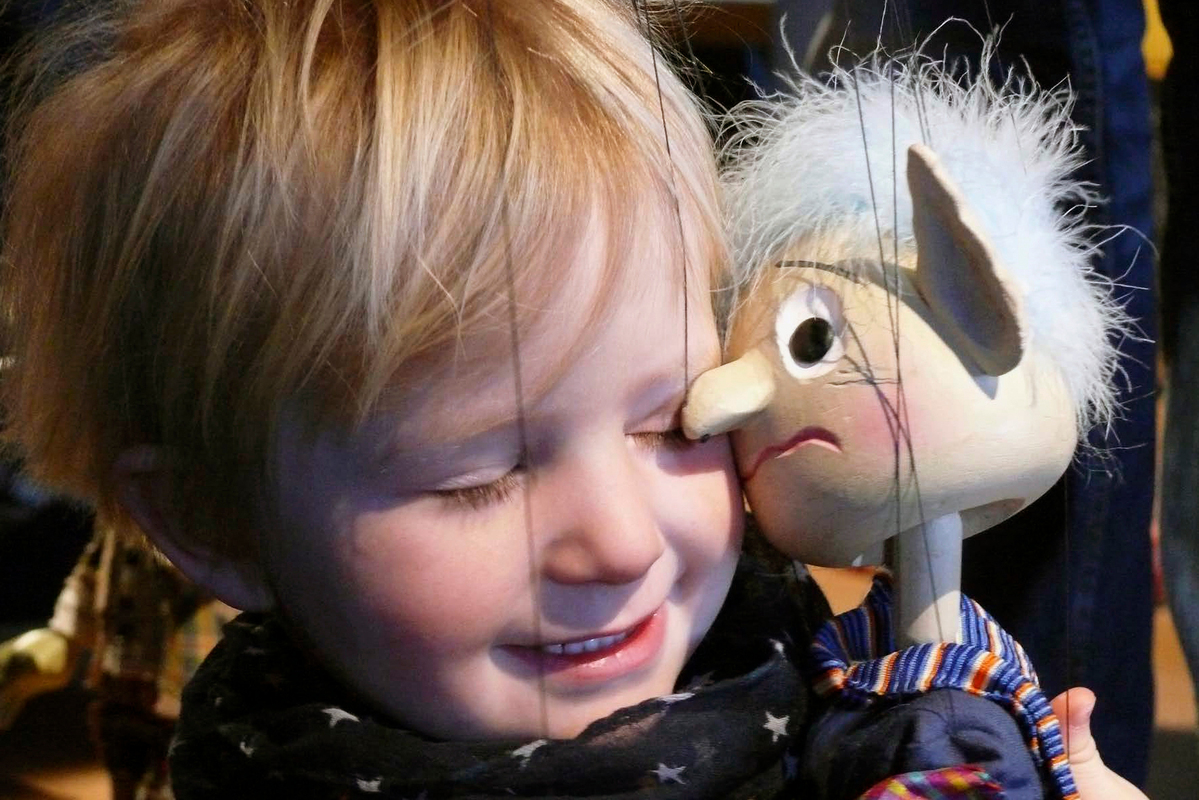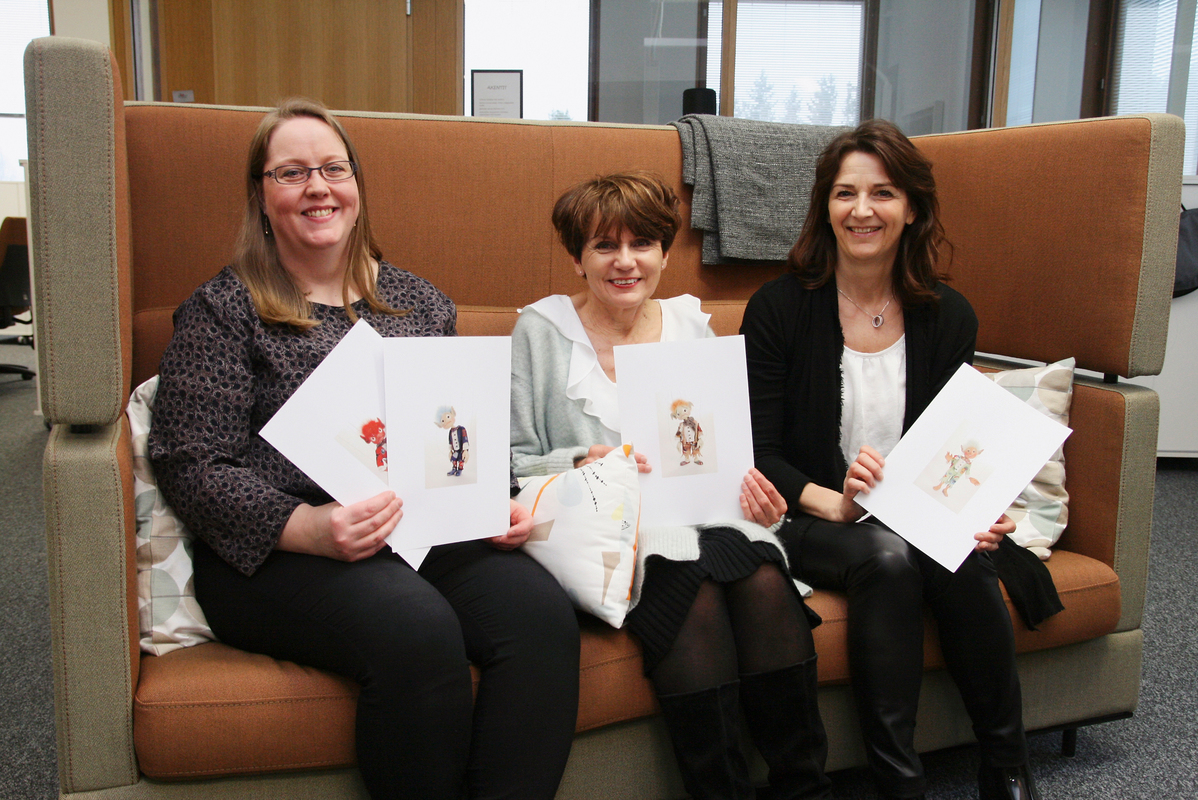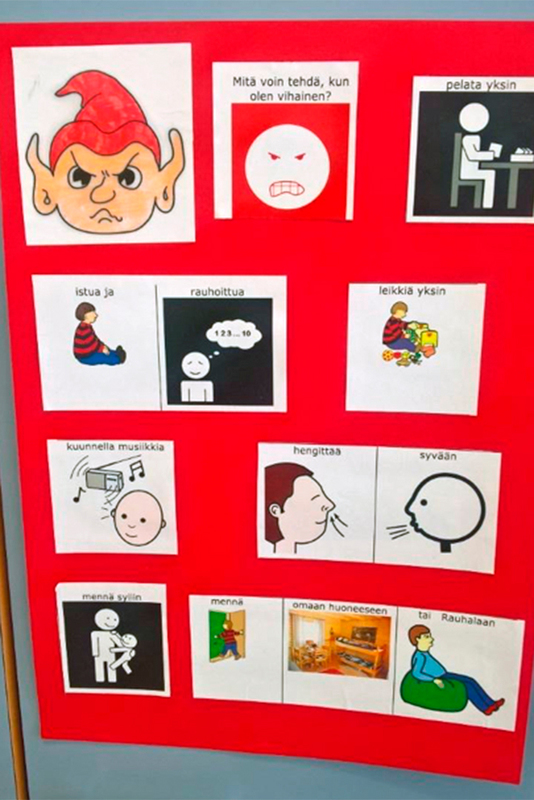Emotion pixies
Emotion pixies Weepybold, Angrybold, Afraidybold and Happybold help children recognise emotions
 How do you feel when you're sad? Where in your body you feel the sorrow? What does help you when you're feeling sad? Children consider these questions in kindergartens with emotion pixies Weepybold, Angrybold, Afraidybold and Happybold. Emotional competencies, i.e. identifying, recognising and controlling one's emotions, develop in social interaction with other people. There are several intervention programmes designed for children's social-emotional development, one of which is Papilio, a programme for preschool education. It is currently under study at the Department of Education in the University of Jyväskylä.
How do you feel when you're sad? Where in your body you feel the sorrow? What does help you when you're feeling sad? Children consider these questions in kindergartens with emotion pixies Weepybold, Angrybold, Afraidybold and Happybold. Emotional competencies, i.e. identifying, recognising and controlling one's emotions, develop in social interaction with other people. There are several intervention programmes designed for children's social-emotional development, one of which is Papilio, a programme for preschool education. It is currently under study at the Department of Education in the University of Jyväskylä.
The Papilio programme supports the development of social-emotional competence
The Papilio programme was originally designed in Germany so as to support the development of social-emotional competencies and socially responsible behaviour of 3–7-year-old children. The methodology is essentially based on inspiring children's imagination and interest by various means such as fairy tales, songs and the puppet characters. The emotion pixies Weepybold, Angrybold, Afraidybold and Happybold familiarise children with the basic emotions of sorrow, anger, fear, and joy. In kindergarten the children and teachers deal with each of these emotions for about a week. Emotions, their expressions and causes as well as coping with these are discussed and emotional skills are trained together in a play-like fashion. Each of the emotion pixies is introduced to the children besides through textual narration, also on CD recordings made by professional actors. These sympathetic pixie characters feed imagination and help children identify with other people's feelings extensively and in long term.
Children's means for the regulation of emotions
It has been shown that when it comes to the development of emotional competencies, children's joint considerations about emotional settings and means for emotional regulation are important. Children participating in the Papilio research described the following means that work when they are experiencing a strong emotion:
”When I'm feeling sad, I would like that we played so then I would feel good again”
”When someone is sad, you can go to the friend and say tha you don't need to be sad. You can also help the friend and comfort or hug him."
”When I'm angry, so it helps if my friend asks me to a bicycle ride.”
”Sometimes [when angry] one may feel so bad that one doesn't want to play with anybody."
”When I'm afraid I take it easy. You can also ask your friend what are you afraid of, hold hands and be together with the friend. And if the friend is happy, you can play with her and say that let's go swinging."
The means reported by children demonstrate that handling emotions with the help of emotion pixies helps children put abstract emotional terms into an approachable form so that these can be discussed and thus also understood. It's not nice to be angry but the unhappy feeling can be mitigated, for instance, by stating that today everything is a bit difficult since I feel just like the Angrybold pixie.
Indeed, early childhood educators have noticed that along with the Papilio programme children speak more about their emotions, are more empathetic to other people's feelings, and take each other better along in their play activities. When training emotional skills it is important to realise that all emotions are accepted, but in expressing them one needs to take into account the feelings of other as well. The pixie characters and their voices have helped children get deeper consideration of emotions. By joint discussions, good ways have been discovered to help understand emotional behaviours of one's own and of others. These competencies are particularly important in children's daily life and interaction both at present and in the future.
Merja Koivula, Riitta Viitala and Marja-Leena Laakso
The Papilio programme for promoting children's social-emotional competence and for preventing self-regulation problems is a joint research project of JYU department of Education and Rauma Teacher Education Department of the University of Turku. The project is led by Vice-Rector, Professor Marja-Leena Laakso and Postdoctoral Researcher Merja Koivula (Dept. of Educ.). In addition to them, the project includes the following researchers: Lecturer Riitta Viitala (Dept. of Educ.), Senior Lecturer Marita Neitola (University of Turku, Rauma TED) and doctoral student Päivi Salo. The project has received funding from the Ministry of Education and Culture.
Read more:
Further information about the Papilio programme is available at: www.papilio.de and
The programme was imported to Finland by the NGO Lapset ensin www.lapsetensin.fi
 Merja Koivula works as a Postdoctoral Researcher at the JYU Department of Education, in the field of early childhood education. She co-leads the research project on the Papilio programme together with Marja-Leena Laakso, and also trains kindergarten staff for the programme. Besides children's social-emotional competencies, her other research interests include, for example, children's activities with digital technologies as well as themes pertaining to children's peer-learning, interaction and play activities.
Merja Koivula works as a Postdoctoral Researcher at the JYU Department of Education, in the field of early childhood education. She co-leads the research project on the Papilio programme together with Marja-Leena Laakso, and also trains kindergarten staff for the programme. Besides children's social-emotional competencies, her other research interests include, for example, children's activities with digital technologies as well as themes pertaining to children's peer-learning, interaction and play activities. Riitta Viitala works as a lecturer in special pedagogy at the JYU Department of Education. Within the Papilio research project her interests focus especially on early childhood educators' perceptions of their own role in implementing the programme. Riitta Viitala is also studying how developmental and pedagogical support can be provided for children within inclusive universal early childhood education taking into account the children's involvement and social participation.
Professor Marja-Leena Laakso is a Vice-Rector of the University of Jyväskylä and responsible for educational issues. She has studied the linguistic development of young children and also support for the social-emotional development of children in several research projects, including the Papilio programme. Marja-Leena Laakso is leading this research programme. Her contribution was pivotal in getting a chance to pilot the programme in Finnish kindergartens.
Feedback to authors: merja.e.koivula@jyu.fi
In the picture (from left), the authors Merja Koivula, Riitta Viitala, and Marja-Leena Laakso. Photo: Martti Minkkinen.
A thematic image: © Papilio e.V.; image inserted in text: Kindergarten children's solutions for angry feelings, image: Merja Koivula.
Translation: Tuomo Suontausta
Previous | Next | To Front Page
